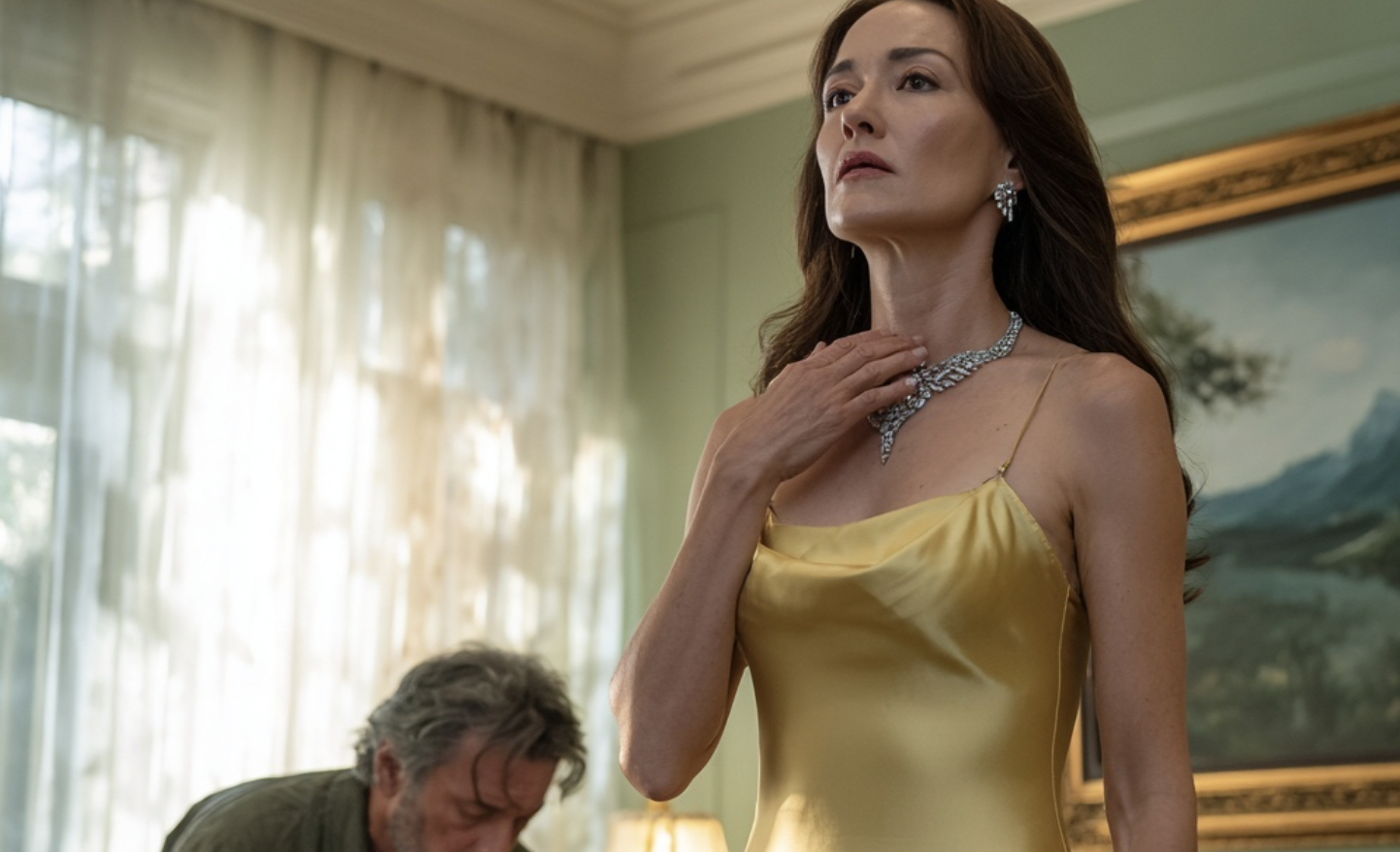Anna Petrovna started sorting the groats again, diligently picking out the black specks as if her whole life depended on the perfect cleanliness of the buckwheat. I knew this ritual by heart—this was how my mother-in-law calmed her nerves before yet another “educational” talk with me.
“Lena, it’s been five years,” she began without lifting her eyes from the bowl. “Five years! And nothing to show for it.”
I kept washing the dishes, trying not to react to the familiar notes in her voice. But inside everything tightened into a hard knot.
“My friend Galya says her daughter-in-law already has two kids. And she only got married two years ago.”
“Anna Petrovna, Dima and I are trying…”
“Trying!” she snorted. “Maybe it’s not about trying. Maybe you should see a doctor? Get yourself checked, find out what’s wrong with you.”
I turned around, feeling my cheeks flush.
“I’ve already been. The doctor said everything’s fine. He said Dima and I should come together…”
“What could possibly be wrong with Dima?” Anna Petrovna protested, finally raising her head. “He’s perfectly fine. A healthy man. It’s you who has something…”
The door banged, and Dima walked into the kitchen. Tired, rumpled, smelling of cigarettes. In recent months he’d been staying late at work more and more, meeting my gaze less and less.
“Hi,” he muttered, heading for the fridge.
“Son, Lena and I are talking,” his mother chimed in. “About children.”
Dima froze with a bottle of beer in his hand.
“Mom, don’t.”
“I will, Dima. I must! You’re young, only thirty. Your whole life is ahead of you. And what do we have? You’re living with a barren wife while the years go by.”
“Anna Petrovna!” I cried.
“What, ‘Anna Petrovna’? I’m telling the truth! Go to the doctors, get treatment. You’ve lost all shame—leaving a healthy man without an heir.”
Dima opened the beer and took a long swig. On his face I didn’t see indignation at his mother’s words or support for me. Only weariness and… agreement?
“Dima, say something,” I pleaded.
He shrugged.
“What is there to say? Facts are facts.”
Those words struck me harder than all my mother-in-law’s barbs. I ran out of the kitchen, slamming the door.
In our small room I collapsed on the bed and let myself cry. Five years ago I was a happy bride, dreamed of a big family, of children. Dima wanted kids then too, said he’d be the best father in the world.
But the years passed and there were no children. And the longer we waited, the colder our relationship became. Dima started staying late at work, disappearing with friends on weekends. And I more and more often noticed how he averted his eyes when we were alone.
Sometimes he came home smelling of someone else’s perfume. When I asked, he brushed it off: “You imagined it.” But I wasn’t blind.
“Dima, maybe we should go to a doctor after all?” I asked one evening, when he was staring at his phone.
“Why?” he replied without looking up.
“Well… to understand what’s going on. The doctor said infertility can be in men, too…”
“Lena, don’t talk nonsense. I’m fine.”
“How do you know?”
He finally tore himself from the screen and looked at me with irritation.
“I just know. And Mom’s right—it’s you who should be getting treated.”
After that conversation he grew even more distant. And my mother-in-law, sensing her son’s support, doubled down.
“My Dima is golden,” she would declaim to her friend on the phone, deliberately loud so I’d hear. “And the wife is worthless. Doesn’t keep the house, doesn’t feed her husband, no kids… What kind of wife is that?”
I tried to ignore it, but every word cut to the quick. Dima kept silent, as if he didn’t hear.
In April he came home late in the evening. I was already in bed, but couldn’t sleep. Hearing his steps, I pretended to be asleep.
Dima fussed in the bathroom for a long time, then quietly lay down beside me. And suddenly he spoke:
“Len, are you awake?”
I stayed silent.
“I know you’re not sleeping. We need to talk.”
I turned toward him. In the half-light his face seemed that of a stranger.
“About what?”
“About us. About what’s happening between us.”
My heart pounded. Could it be he was finally ready to discuss our problems? To admit he’d grown distant? That something had to change?
“Lena, I think…” He paused. “I think we should get a divorce.”
The world flipped over. I sat up, blood roaring in my ears.
“What?”
“I filed an application at the registry office. In a month it’ll all be over.”
“Dima… why? We can fix this…”
“Fix what?” There was weariness in his voice. “Lena, we’re just not right for each other. And the kids… I need kids. Heirs. And with you there won’t be any.”
“But we haven’t really been checked! Maybe it isn’t me…”
“It is you,” he said harshly. “Mom is right. I’m fine.”
I looked at the man I’d lived with for five years and didn’t recognize him. Where was the Dima who swore he loved me? Who said we’d overcome everything together?
“At my mother-in-law’s urging, my husband dumped me,” I whispered, and the words sounded like a sentence.
Dima turned to the wall.
“No one’s dumping you. Our marriage has just run its course.”
I didn’t sleep a wink the rest of the night. And in the morning, when Dima left for work and my mother-in-law went to the clinic, the phone rang.
“Lenochka, sweetheart,” I heard my mother’s agitated voice. “I have news for you.”
“Mom, not now. Dima and I…”
“Lena, listen to me. Aunt Vera has died.”
Aunt Vera. Mom’s older sister who had moved to Moscow many years ago and with whom we hardly kept in touch. We saw each other rarely, at big family celebrations, and not always then.
“My condolences, Mom. But I really can’t now…”
“Lena! She left everything to you!”
I didn’t understand.
“What?”
“She had no children, remember? So she made a will. An apartment in Moscow, bank accounts… Lena, it’s more than five million rubles!”
The receiver slipped from my hand. Five million? An apartment in Moscow? This had to be a mistake.
But Mom was serious. It turned out Aunt Vera had worked her whole life at a big company, invested money, been very frugal. And she truly had no children—either it hadn’t worked out or she hadn’t wanted them. And she left her entire estate to me—her only niece.
The following weeks flew by in a fog. I rushed between lawyers, notaries, banks. I registered the inheritance, dealt with the paperwork. During that time Dima practically stopped sleeping at home, and my mother-in-law ostentatiously ignored me.
“Nice arrangement,” she threw out one morning as I was packing my things. “I bet you inherited junk, and now you don’t need a man.”
I didn’t try to explain that the inheritance had nothing to do with it. That I’d trade all those millions for one warm look from my husband, for his support in a hard moment.
The divorce was purely formal. Dima came to the registry office gloomy, didn’t even try to talk. We signed—and that was it. Five years of marriage ended with signatures in a book.
I moved to Moscow at the start of summer. My aunt’s apartment turned out to be a spacious two-room place in a good neighborhood. Old-fashioned, but cozy. It smelled of lavender and old books.
For the first few days I simply put the apartment in order, went through her things. And gradually I began to breathe more freely. No one nagged me about being childless. No one told me I was a bad wife. No one compared me to other women.
Then came an idea I’d carried for years but had never dared to bring to life. A flower shop. I’d always loved flowers, knew a thing or two about them. In my former life it was just a pretty dream. Now I had a chance to make it real.
A small basement space turned up quickly. The rent was manageable, and the location was good. A metro station nearby, residential buildings, a small office center.
I named the shop “Lavender”—in honor of my aunt’s favorite scent. And I plunged headfirst into work. I looked for suppliers, studied which flowers were in demand, learned to compose bouquets.
The first customers appeared in the very first week. A young girl bought roses for her mother. An elderly man chose chrysanthemums for his wife’s celebration. An office worker ordered a basket for a colleague’s birthday.
Each purchase warmed my soul. I felt needed, useful. And most importantly—free. No one controlled my every step, criticized me, demanded reports.
By autumn things were going even better. I had regular clients; people ordered bouquets for weddings and corporate events. I even hired an assistant—Masha, a young girl who knew flowers no worse than I did.
And then, on a rainy November evening, the phone rang. An unknown number, but I recognized the voice at once.
“Lena, it’s me. Dima.”
A familiar pain pricked my heart, but I was surprised by how quickly it passed.
“Hi.”
“How are you? How are things there?”
“Fine. What do you need?”
“I’m in the capital. Can I come over? Talk? I have a proposal.”
I almost laughed. A proposal! After six months of silence.
“Let’s meet at a café. Tomorrow at seven. Do you know ‘Shokolad’ on Tverskaya?”
He arrived exactly at seven. He looked worse, drawn. The suit no longer fit as impeccably as before. And there was something new in his eyes—uncertainty.
“You look stunning,” he said when we sat down.
It was true. I’d lost weight, started taking care of myself, bought new clothes. For the first time in many years I felt attractive.
“Thank you. You wanted to talk?”
Dima fidgeted and ordered coffee.
“Lena, I understand that I treated you unfairly…”
“You do?”
“Yes. And I want to make it right. Let’s try again. Let’s get married again.”
I sipped my tea, studying his face. Once, that proposal would have made my heart stop with happiness. Now I felt only fatigue.
“Why?”
“What do you mean why? We loved each other. We can love each other again.”
“Dima, that chapter is closed for me.”
He leaned across the table and took my hand.
“Lena, I got tested. You were right. The problem is with me. I’ve got issues… on the male side. It’s treatable, but it takes time.”
There it was. What I’d asked him to find out a year ago. What might have saved our marriage if he’d listened back then.
“And now what?”
“Now I know the truth. And I want us to try again. We’ll undergo treatment, and we’ll have kids.”
I pulled my hand free.
“Dima, I have a different life now. I’m happy.”
“Oh, come on!” That familiar note of irritation crept into his voice. “What kind of happiness is that? Selling little flowers?”
“And is that your concern?”
“Lena, don’t be stubborn. I know you got an inheritance. You think you don’t need a man now? Money isn’t everything.”
There it was. That’s why he came. Not out of love, not out of remorse. Because he’d found out about the inheritance.
“So it turns out you showed up precisely when you learned I have money and a business,” I said calmly.
Dima flushed.
“What do money have to do with it? I love you!”
“Of course. You were silent for six months, and as soon as you heard about the millions—suddenly love awoke.”
“Don’t talk nonsense!” he raised his voice. “Mother was right. You’re a mercenary nobody. Got some money and stuck your nose in the air.”
I stood up.
“Tell my mother-in-law she now has every chance to find a better wife for her son. I’m sure she’ll find someone better than me.”
“Lena!”
But I was already walking to the exit without looking back.
Outside I drew in a deep breath of cold air and felt incredible relief. As if a heavy weight I’d been dragging for years had fallen from my shoulders.
Bouquets were waiting for me at the shop, ones I had to prepare for a wedding the next day. I turned on some music and got to work. White roses, lisianthus, greenery… Each bouquet came together like a little work of art.
“Are you not closed yet?” I heard a man’s voice.
In the doorway stood a tall man of about forty, in an expensive coat. He rented the space on the floor above—some kind of internet business.
“We’re not closed. What do you need?”
“Roses. Red ones. For… for a girl.”
I smiled.
“How many?”
“How many do people usually give?”
“It varies. One—if it’s just because. Three—if you’re apologizing. Five—if you’re confessing your love.”
He thought for a moment.
“Then five.”
While I wrapped the bouquet, he studied the display.
“You have a beautiful shop. Cozy.”
“Thank you.”
“By the way, I’m Andrey. We’re neighbors, and somehow we’re still not acquainted.”
“Lena.”
“Lena, would you mind if I dropped by sometimes for coffee? My machine upstairs broke, and there’s nowhere nearby to get a decent cup.”
I looked at him more closely. A pleasant face, kind eyes, an open smile.
“Come by. My coffee is good.”
Andrey started stopping in every morning. At first just for coffee, then we began to talk. He told me about his business—online marketing; I told him about flowers and customers.
Gradually our conversations grew longer, our topics—broader. It turned out we both love classic literature, old movies, travel. We share a similar sense of humor and view of life.
In December he invited me to the theater.
“This isn’t a date,” he hastened to clarify. “I just have an extra ticket to Anna Karenina.”
“Of course,” I smiled. “Just the theater.”
But after the performance we went to a café, then walked through snowy Moscow late into the night. And I realized I hadn’t felt so light and happy in a long time.
Over the winter we saw each other more and more. We went to museums, movies, just walked. Andrey turned out to be an amazing person—attentive, gentle, with a wonderful sense of humor. He didn’t pry about the past, didn’t push, didn’t demand.
In February, as we sat in my apartment over tea, he suddenly said:
“Lena, I’m in love with you.”
My heart raced—not with fear, as before, but with joy.
“I am too.”
He embraced me, and I felt what I hadn’t felt in years—absolute trust, calm, the certainty that I was wanted and loved.
In March I realized I was pregnant. The test showed two lines, and I sat in the bathroom staring at them, unable to believe my eyes. Pregnant. Finally pregnant.
Andrey reacted exactly as I had once dreamed someone would. He swept me up in his arms, spun me around the room, laughing and crying at the same time.
“Will you be my wife?” he asked, setting me down.
“Do I have a choice?” I laughed.
“No. No choice at all.”
We registered our marriage in May, in a small hall at the city administration. No festivities, just the two of us, my mother, and Andrey’s parents. Simple and happy.
Now, looking at my reflection in the mirror, I think about how strange life can be. A year ago I was an unhappy wife, considered barren. Today I’m a successful businesswoman, a beloved wife, and a mother-to-be.
Dima never found out about my pregnancy. But sometimes I think what I’d say to him now: “On your mother’s advice, you left me. But you didn’t know I had a whole fortune—and now you’ve lost it.”
Not just the money—you lost me. And I have found myself.



